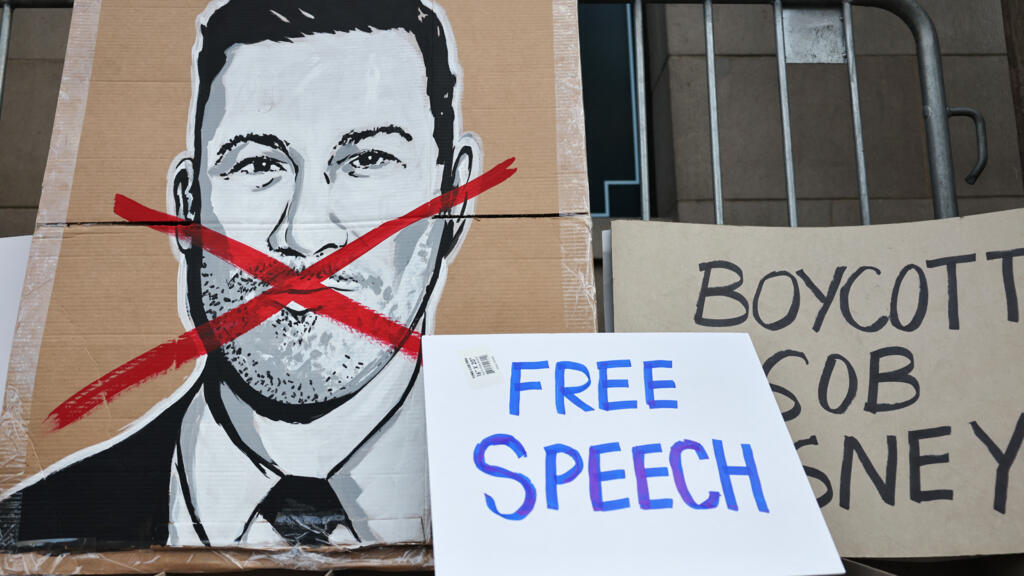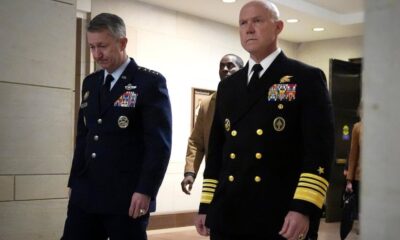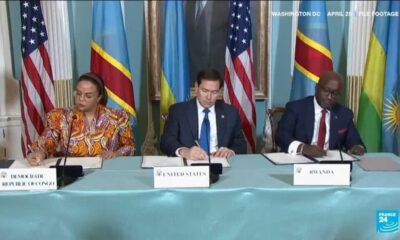Politics
Trump Proposes Revoking TV Licenses Over Negative Coverage

U.S. President Donald Trump has threatened to revoke the licenses of television networks that he claims provide unfavorable coverage of his administration. This declaration has intensified a national conversation about free speech and media accountability, particularly following comments made by talk-show host Jimmy Kimmel regarding the political discourse surrounding the death of conservative commentator Charlie Kirk.
During a press conference on October 20, 2023, Trump expressed his dissatisfaction with how he has been portrayed by certain networks, suggesting that their reporting has been detrimental to public perception. He emphasized that these networks should face consequences for what he perceives as biased coverage.
The implications of Trump’s statements have sparked significant debate across various sectors, particularly among media analysts and First Amendment advocates. Critics argue that such threats could undermine journalistic independence and further polarize the media landscape in the United States.
Media Responses and Public Reactions
Following Trump’s remarks, several media organizations issued statements defending their reporting practices. They argue that maintaining journalistic integrity is essential, regardless of political pressures. MSNBC, CNN, and ABC have reiterated their commitment to unbiased news coverage, stating that they will continue to report on the administration’s actions without fear of retribution.
Public opinion appears divided. Some supporters of Trump express approval of his stance, viewing it as a necessary measure to hold media outlets accountable. Conversely, numerous critics assert that such actions threaten the principles of democracy, particularly the right to free speech.
Kimmel’s suspension for his comments about Kirk’s death has also drawn attention to the broader issue of how public figures navigate sensitive topics. His remarks ignited backlash from various political factions, further complicating the national conversation around media responsibility and the consequences of public discourse.
The Broader Impact on Free Speech
Experts in constitutional law have weighed in on the potential ramifications of Trump’s threats. According to Barbara Smith, a professor of media law at Harvard University, “Threatening to revoke licenses is a dangerous precedent that could chill free expression.” Smith emphasizes that the First Amendment protects the press from government interference, and any attempt to undermine this principle could have lasting consequences for democratic governance.
As this debate unfolds, the tension between political power and media scrutiny remains palpable. Trump’s actions have not only sparked discussions about press freedom but also raised questions about the relationship between elected officials and the media.
In the coming weeks, it will be crucial to observe how media outlets respond to these challenges and whether political discourse continues to evolve in the face of such threats. The situation reflects broader societal divisions regarding the role of media in politics and the expectations of transparency from both sides of the political spectrum.
As Trump continues to navigate his presidency, the balance between media criticism and political accountability remains a critical issue that will undoubtedly shape the landscape of American politics in the months to come.
-

 Politics4 weeks ago
Politics4 weeks agoSecwepemc First Nation Seeks Aboriginal Title Over Kamloops Area
-

 World5 months ago
World5 months agoScientists Unearth Ancient Antarctic Ice to Unlock Climate Secrets
-

 Entertainment5 months ago
Entertainment5 months agoTrump and McCormick to Announce $70 Billion Energy Investments
-

 Science5 months ago
Science5 months agoFour Astronauts Return to Earth After International Space Station Mission
-

 Lifestyle5 months ago
Lifestyle5 months agoTransLink Launches Food Truck Program to Boost Revenue in Vancouver
-

 Technology3 months ago
Technology3 months agoApple Notes Enhances Functionality with Markdown Support in macOS 26
-

 Lifestyle3 months ago
Lifestyle3 months agoManitoba’s Burger Champion Shines Again Amid Dining Innovations
-

 Top Stories2 months ago
Top Stories2 months agoUrgent Update: Fatal Crash on Highway 99 Claims Life of Pitt Meadows Man
-

 Politics4 months ago
Politics4 months agoUkrainian Tennis Star Elina Svitolina Faces Death Threats Online
-

 Sports5 months ago
Sports5 months agoSearch Underway for Missing Hunter Amid Hokkaido Bear Emergency
-

 Politics5 months ago
Politics5 months agoCarney Engages First Nations Leaders at Development Law Summit
-

 Technology5 months ago
Technology5 months agoFrosthaven Launches Early Access on July 31, 2025




















